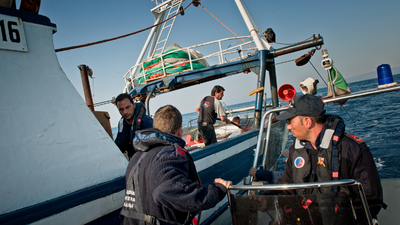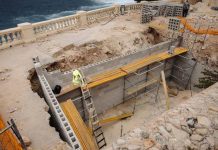The work of the Ministry for Agriculture, Fisheries and Animal Rights against illegal fishing does not start with each lampuki season but has been ongoing for the past few years.
In fact, this is reflected in the number of achievements by the Maltese authorities such as the introduction of recommendations and regulations at a regional Mediterranean level and even at a European level. At the request of the Maltese authorities among others, since a few years ago the number of vessels of the European Fisheries Control Agency (EFCA) has increased and one of them is specifically requested to inspect areas known for illegal lampuki fishing during this period.
In fact, this vessel entered Malta last June and is currently inspecting near Sicily. This work and the reputation of the Maltese Authorities with both the European Fisheries Control Agency (EFCA) and the Directorate-General for Maritime Affairs and Fisheries (DG MARE) also led to the European Commissioner Costas Kadis visiting Malta last June, precisely in the first months of his mandate as European Commissioner responsible for Fisheries. This was in order to better understand the arguments being put forward by the Maltese authorities and to meet personally with Maltese fishermen to understand their difficulties.
The lampuki fishery is regulated by European regulation and follows the recommendations covering fishing in the Mediterranean issued by the General Fisheries Commission for the Mediterranean (GFCM). These regulations clearly state that the season opens on 15 August. While the Maltese Authorities are already working to convince the European institutions to consider changing this date, also due to climatic reasons that are affecting the time in which the lampuka migrates, it is certainly not a solution for the Maltese Government and Authorities to encourage the violation of current regulations.
This is because we believe that this should be done through the appropriate legislative processes in the European institutions. We believe that this is also the way for the Maltese authorities to remain consistent and credible in their arguments against illegal fishing and also in favor of the rule of law. In parallel, the Department of Fisheries and Aquaculture is carrying out coordinated work with the Armed Forces of Malta and the EFCA. In fact, as soon as videos began to circulate on social media of fishermen in the Mediterranean catching lampukas on 1 August, the Department officially informed the EFCA. That is why EFCA urgently convened the working group on lampuki nets on Thursday 7 August.
During this meeting, Malta proposed that the Ocean Sentinel be deployed to carry out inspections in the Strait of Sicily, and by Thursday evening it was already monitoring the requested area. This is further clear evidence of how effective the Maltese authorities are being in the European institutions. All this is also being done in compliance with the regulation approved in the European Parliament led by MEP Thomas Bajada against illegal fishing by third countries, a regulation that not only aims to stop these practices but also to impose serious and effective penalties to deter those who break the law.
Minister for Agriculture, Fisheries and Animal Rights Anton Refalo said that, “The Government is not only committed to defending Maltese and Gozitan fishermen, but also to looking towards the sustainability and future of fishing in our country. The Ministry will continue to safeguard the rights of Maltese and Gozitan fishermen as well as their families throughout the year, especially and not least during the lampuki season. Fishermen know very well who is really working and wish them the best and the best measures for their welfare.”
Parliamentary Secretary for Fisheries, Aquaculture and Animal Rights Alicia Bugeja Said highlighted the ongoing commitment that our country has to safeguard the interests of Maltese fishermen while promoting sustainability. “In cooperation with the European Commission, Malta will continue to support our fishing communities. This Government is ensuring that our seas are responsibly protected for future generations. We are also requesting full support from the European Commission at GFCM level, so that the laws are enforced and those who do not comply with them face appropriate consequences.”
It is a fact that last year fewer lampuki entered the fishery, a fact also linked to climate change and its effects on our sea. The heat in the Mediterranean led to the sea temperature rising earlier than usual, and this had a direct impact on the lampuki season. Accordingly, the Department is already carrying out a scientific study on the impact of climate change on the lampuki fishery, so that the arguments presented before the European institutions are based on facts and science, not on assumptions.
![]()








